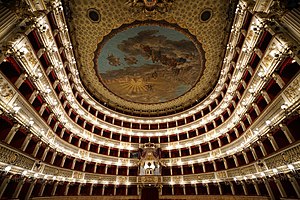Neapolitan School
- View a machine-translated version of the Italian article.
- Machine translation, like DeepL or Google Translate, is a useful starting point for translations, but translators must revise errors as necessary and confirm that the translation is accurate, rather than simply copy-pasting machine-translated text into the English Wikipedia.
- Consider adding a topic to this template: there are already 3,075 articles in the main category, and specifying
|topic=will aid in categorization. - Do not translate text that appears unreliable or low-quality. If possible, verify the text with references provided in the foreign-language article.
- You must provide copyright attribution in the edit summary accompanying your translation by providing an interlanguage link to the source of your translation. A model attribution edit summary is
Content in this edit is translated from the existing Italian Wikipedia article at [[:it:Scuola musicale napoletana]]; see its history for attribution. - You may also add the template
{{Translated|it|Scuola musicale napoletana}}to the talk page. - For more guidance, see Wikipedia:Translation.

In music history, the Neapolitan School is a group, associated with opera, of 17th and 18th-century composers who studied or worked in Naples, Italy,[1] the best known of whom is Alessandro Scarlatti, with whom "modern opera begins".[2] Francesco Provenzale is generally considered the school's founder.[3] Others significant composers of this school are Giambattista Pergolesi, Domenico Cimarosa and Giovanni Paisiello.
It is with the Neapolitan school...that the History of Modern Music commences—insofar as that music speaks the language of the feelings, emotions, and passions.
— Schluter[4]
The Neapolitan School has been considered in between the Roman School and the Venetian School in importance.[4]
However, "The concept of Neapolitan school, or more particularly Neapolitan opera, has been questioned by a number of scholars. That Naples was a significant musical center in the 18th century is beyond doubt. Whether the composers working in Naples at that time developed or partook of a distinct and characteristic musical style is less clear" since so little is known about the repertory.[1]
Members
- Girolamo Abos (1715-1760)
- Cataldo Amodei (1649-1693)
- Gaetano Andreozzi (1755-1826)
- Pasquale Anfossi (1727-1797)
- Francesco Araja (1709-1770 circa)
- Gennaro Astarita (1749-1805)
- Pietro Auletta (1698 circa-1771)
- Michele Caballone (1692-1740)
- Pasquale Cafaro (1715-1783)
- Luigi Caruso (1754-1823)
- Domenico Cimarosa (1749–1801)
- Carlo Coccia (1782-1873)
- Nicola Conforto (1718-1793)
- Antonio Corbisiero (1720-1790)
- Francesco Corbisieri (1733 circa-1802)
- Giacomo Cordella (1786-1847)
- Giuseppe Curcio (1752-1832)
- Egidio Romualdo Duni (1708-1775)
- Francesco Durante (1684–1755)[2]
- Lorenzo Fago (1704-1793)
- Nicola Fago (1677-1745)
- Pasquale Fago (1740-1994)
- Fedele Fenaroli (1730-1818)
- Francesco Feo (1691–1761)
- Nicola Fiorenza (?-1764)
- Ignazio Fiorillo (1715-1787)
- Domenico Fischietti (1725-1810)
- Gaspare Gabellone (1727-1796)
- Giuseppe Giordani (1751-1798)
- Tommaso Giordani (1730 circa-1806)
- Pietro Alessandro Guglielmi (1728-1804)
- Gaetano Greco (1657circa-1728)
- Giacomo Insanguine (1728-1793)
- Niccolò Jommelli (1714–1774)
- Gaetano Latilla (1711-1788)
- Vincenzo Lavigna (1776-1836)
- Leonardo Leo (1694–1744)[1][2]
- Nicola Bonifacio Logroscino (1698-1765 circa)
- Nicola Manfroce (1791-1813)
- Gennaro Manna (1715-1779)
- Gian Francesco de Majo (1732–1770
- Giuseppe de Majo (1697-1771)
- Francesco Mancini (1672-1737)
- Gaetano Manna (1751-1804)
- Pietro Marchitelli (1643 -1729)
- Gaetano Marinelli (1754-1820 circa)
- Giuseppe Mosca (1772-1839)
- Luigi Mosca (1775-1824)
- Giovanni Paisiello (1740–1816)
- Antonio Palella (1692-1761)
- Silvestro Palma (1754-1834)
- Pietro Domenico Paradies (1707-1791)
- Niccolò Piccinni (1728–1800)
- Giovanni Battista Pergolesi (1710–1736)[1][2]
- Andrea Perrucci (1651-1704)
- Nicola Porpora (1686–1768)
- Giuseppe Porsile (1680-1750)
- Francesco Provenzale (1624–1704)[1][2]
- Angelo Ragazzi (1680-1750)
- Donato Ricchezza (1648-1716)
- Antonio Sacchini (1730-1786)
- Nicola Sala (1713-1801)
- Giovanni Salvatore (1611-1688)
- Angelo Tarchi (1760 circa-1814)
- Giacomo Sarcuni (1690 - 1758)
- Domenico Sarro (1679-1744)
- Alessandro Scarlatti (1660–1725)
- Giuseppe Scarlatti (1718 or 1723-1777)
- Gregorio Sciroli (1722-1781)
- Giuseppe Sellitto (1700-1777)
- Alessandro Speranza (1724-1797)
- Tommaso Traetta (1727–1779)
- Giacomo Tritto (1733-1824)
- Gennaro Ursino (1650-?)
- Vincenzo Lavigna (1776-1836)
- Gaetano Veneziano (1665-1716)
- Giovanni Veneziano (1683-1742)
- Mattia Vento (1735-1776)
- Leonardo Vinci (1690–1730)[1][2]
- Nicola Antonio Zingarelli (1752-1837)
See also
Sources
- ^ a b c d e f Don Michael Randel (2003). The Harvard Dictionary of Music, p. 549. ISBN 978-0-674-01163-2.
- ^ a b c d e f Paul Henry Lang (1997). Music in Western Civilization, p. 453. ISBN 978-0-393-04074-6.
- ^ Robinson, Michael F.; Monson, Dale E. (2002) [1992]. "Provenzale, Francesco (opera)". Grove Music Online. Oxford, England: Oxford University Press. doi:10.1093/gmo/9781561592630.article.O002372. ISBN 978-1-56159-263-0. (subscription or UK public library membership required)
- ^ a b Schluter, Joseph (1865). A General History of Music, p.47. R. Bentley.
- v
- t
- e
 | This music-related article is a stub. You can help Wikipedia by expanding it. |
- v
- t
- e













